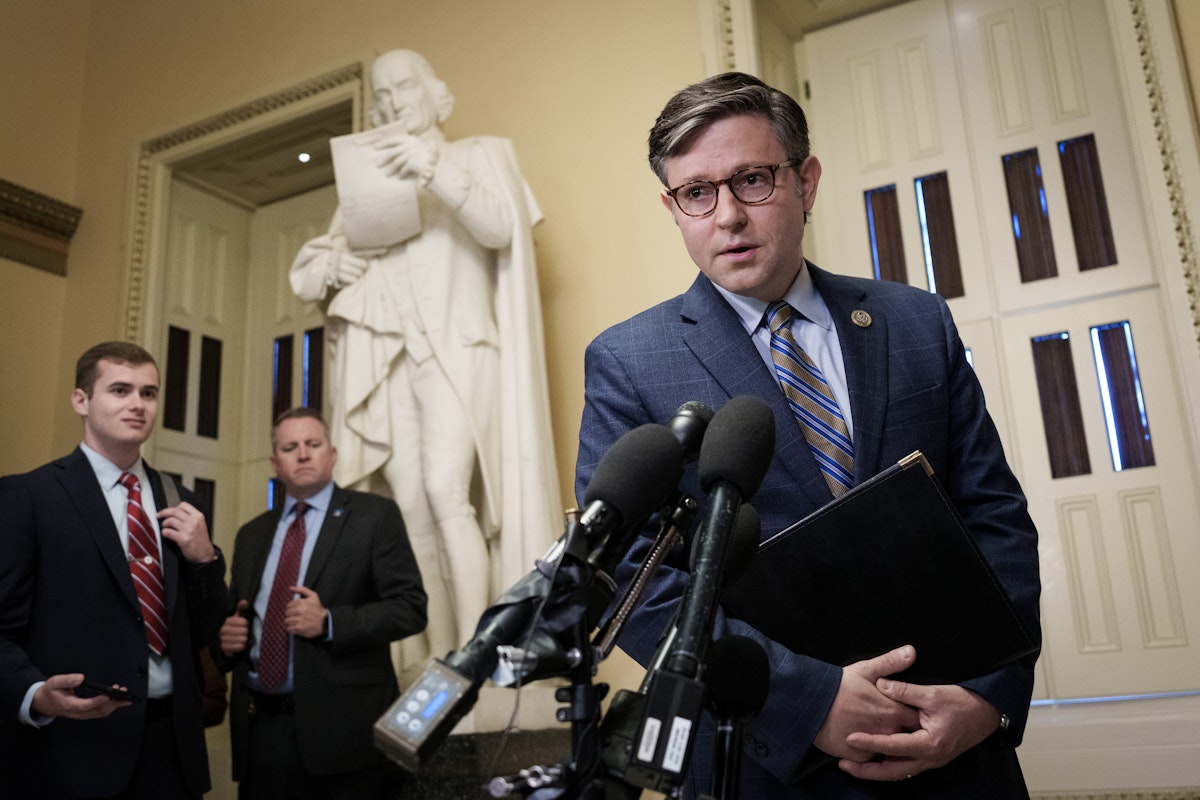The House Has a Speaker. On to Averting the Next Shutdown
Congress is, once again, hurtling toward a government shutdown, with just three weeks left until the stopgap funding measure that averted the last one expires. Despite the urgency of the issue, lawmakers are far from a consensus on appropriations bills, in part because the House of Representatives lacked a speaker for the majority of October.While the election of Speaker Mike Johnson on Wednesday has alleviated some of the chaotic vibes, the question remains: Are members of Congress ready to put the “fun” back into “government funding?”“There’s nothing fun in this,” Representative Byron Donalds, a conservative Republican, told me. “There’s going to be some compromises that have to be made, but I think we can get there.”Johnson has an ambitious agenda for keeping the government funded. According to a letter to colleagues sent earlier this week, he hopes to pass another continuing resolution keeping the government funded through January 15 or April 15—whichever is more popular with the majority of Republicans. (A deal negotiated by President Joe Biden and former Speaker Kevin McCarthy to raise the debt ceiling would implement 1 percent cuts in discretionary spending if Congress has not passed appropriations bills by April 30.) Johnson also hopes to pass all 12 appropriations bills written by House Republicans before the current short-term funding measure expires on November 17.Conservative Republicans have been largely opposed to another continuing resolution—indeed, the passage of the current stopgap measure angered certain hard-line Republicans enough to precipitate McCarthy’s ouster—but with the clock ticking down toward a shutdown, Congress may have no choice. Representative Thomas Massie, a Republican with a distinct libertarian streak, said that Johnson had enough “goodwill” to pass even a year-long continuing resolution—which is generally antithetical to conservative preferences.“I think Mike Johnson has a great period here, where it’ll be at least 30 days before we get stabby again,” Massie joked, obliquely referring to the intraparty divisions that consumed House Republicans for several weeks. “There’s no real leverage in it for us to have this shutdown impending, so if I were him in this grace period, I would buy myself the entire year of runway.”The House has passed five of its appropriations bills, with spending levels well under what Biden and McCarthy agreed to in their June deal to raise the debt ceiling. The agriculture appropriations bill, typically one of the easier funding measures to pass, also failed to pass over the summer, due to opposition from more moderate Republicans to a provision that would limit access to abortion medication. (Johnson’s letter has that bill saved for consideration the week of November 13, just before the deadline.) Although Johnson himself voted against the short-term funding bill, his priorities may change now that he is speaker.“The rank-and-file Johnson had a very specific set of priorities and positions. The question is if that translates into the [speaker] position,” Republican Senator Thom Tillis told me on Wednesday. “But right now, I’m going to give him the benefit of the doubt.”Meanwhile the Senate is working on passing the first three of its appropriations bills, after weeks of procedural delays. GOP Senator Mike Rounds expressed hope that the Senate could take up the remaining nine appropriations bills in an expedited fashion, and noted that—unlike in the House—the Senate measures are passing with support from lawmakers on both sides of the aisle. The Senate appropriations bills are hewing to the spending levels agreed to by Biden and McCarthy, and do not include some of the far-right priorities that have been tucked into the House measures.“The fact that it’s coming out of the Senate on a bipartisan plan hopefully will allow the House to recognize in a bipartisan way, as well, that in divided government, you’re never going to get anything you want, and you try to make progress,” Rounds told me. (When asked whether he was ready to put the “fun” back in “government funding,” Rounds laughed and replied: “I haven’t quite heard that before.”)Also at issue: a supplemental funding request by the Biden administration for aid to Israel and Ukraine, as well as money dedicated to shoring up the southern border. Republicans have expressed concerns about the supplemental, making its prospects somewhat tenuous. “I would be quite surprised if the president’s supplemental got an up-or-down vote as a package. I think there’s overwhelming interest in breaking that into some different parts,” GOP Representative Dusty Johnson told me on Tuesday.The newly elected speaker has previously expressed skepticism regarding aid to Ukraine, and voted against a bill to send $300 million to the country last month. The White House has furthermore issued another request for a domestic funding supplemental, including priorities such as childcare, but that measure is even less likely to

Congress is, once again, hurtling toward a government shutdown, with just three weeks left until the stopgap funding measure that averted the last one expires. Despite the urgency of the issue, lawmakers are far from a consensus on appropriations bills, in part because the House of Representatives lacked a speaker for the majority of October.
While the election of Speaker Mike Johnson on Wednesday has alleviated some of the chaotic vibes, the question remains: Are members of Congress ready to put the “fun” back into “government funding?”
“There’s nothing fun in this,” Representative Byron Donalds, a conservative Republican, told me. “There’s going to be some compromises that have to be made, but I think we can get there.”
Johnson has an ambitious agenda for keeping the government funded. According to a letter to colleagues sent earlier this week, he hopes to pass another continuing resolution keeping the government funded through January 15 or April 15—whichever is more popular with the majority of Republicans. (A deal negotiated by President Joe Biden and former Speaker Kevin McCarthy to raise the debt ceiling would implement 1 percent cuts in discretionary spending if Congress has not passed appropriations bills by April 30.) Johnson also hopes to pass all 12 appropriations bills written by House Republicans before the current short-term funding measure expires on November 17.
Conservative Republicans have been largely opposed to another continuing resolution—indeed, the passage of the current stopgap measure angered certain hard-line Republicans enough to precipitate McCarthy’s ouster—but with the clock ticking down toward a shutdown, Congress may have no choice. Representative Thomas Massie, a Republican with a distinct libertarian streak, said that Johnson had enough “goodwill” to pass even a year-long continuing resolution—which is generally antithetical to conservative preferences.
“I think Mike Johnson has a great period here, where it’ll be at least 30 days before we get stabby again,” Massie joked, obliquely referring to the intraparty divisions that consumed House Republicans for several weeks. “There’s no real leverage in it for us to have this shutdown impending, so if I were him in this grace period, I would buy myself the entire year of runway.”
The House has passed five of its appropriations bills, with spending levels well under what Biden and McCarthy agreed to in their June deal to raise the debt ceiling. The agriculture appropriations bill, typically one of the easier funding measures to pass, also failed to pass over the summer, due to opposition from more moderate Republicans to a provision that would limit access to abortion medication. (Johnson’s letter has that bill saved for consideration the week of November 13, just before the deadline.) Although Johnson himself voted against the short-term funding bill, his priorities may change now that he is speaker.
“The rank-and-file Johnson had a very specific set of priorities and positions. The question is if that translates into the [speaker] position,” Republican Senator Thom Tillis told me on Wednesday. “But right now, I’m going to give him the benefit of the doubt.”
Meanwhile the Senate is working on passing the first three of its appropriations bills, after weeks of procedural delays. GOP Senator Mike Rounds expressed hope that the Senate could take up the remaining nine appropriations bills in an expedited fashion, and noted that—unlike in the House—the Senate measures are passing with support from lawmakers on both sides of the aisle. The Senate appropriations bills are hewing to the spending levels agreed to by Biden and McCarthy, and do not include some of the far-right priorities that have been tucked into the House measures.
“The fact that it’s coming out of the Senate on a bipartisan plan hopefully will allow the House to recognize in a bipartisan way, as well, that in divided government, you’re never going to get anything you want, and you try to make progress,” Rounds told me. (When asked whether he was ready to put the “fun” back in “government funding,” Rounds laughed and replied: “I haven’t quite heard that before.”)
Also at issue: a supplemental funding request by the Biden administration for aid to Israel and Ukraine, as well as money dedicated to shoring up the southern border. Republicans have expressed concerns about the supplemental, making its prospects somewhat tenuous. “I would be quite surprised if the president’s supplemental got an up-or-down vote as a package. I think there’s overwhelming interest in breaking that into some different parts,” GOP Representative Dusty Johnson told me on Tuesday.
The newly elected speaker has previously expressed skepticism regarding aid to Ukraine, and voted against a bill to send $300 million to the country last month. The White House has furthermore issued another request for a domestic funding supplemental, including priorities such as childcare, but that measure is even less likely to pass in the GOP-controlled House—or avoid a filibuster in the upper chamber.
It’s unclear how quickly the chambers of Congress could resolve the differences between their appropriations legislation—meaning that another stopgap funding measure is all but inevitable. “Nobody benefits from a government shutdown, so I don’t think that’s an issue. But it means that when we don’t do our business on a timely basis, then we’re stuck with a [continuing resolution],” said GOP Senator John Cornyn.
Democratic Senator Tim Kaine also argued that another continuing resolution was necessary to complete the budget process in a timely manner. Unlike Johnson or Massie, however, he suggested an end-of-year deadline. “Let’s just do this the way we do it most years: Put the date at the end of the year, work really hard, lock people into rooms, and then nobody goes home until we get the budget done,” Kaine said on Tuesday.



